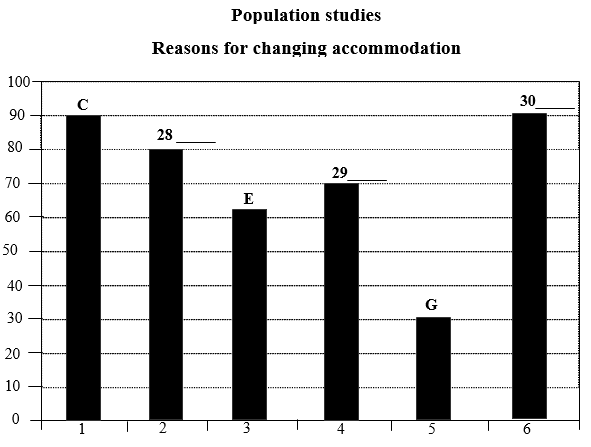

[00:41.00]MELANIE:Excuse me, DR JOHNSON.
[00:42.78]May I speak to you for a minute?
[00:44.75]DR JOHNSON:Sure.
[00:45.36]Come in.
[00:46.26]MELANIE:I'm MELANIE Griffin.
[00:48.33]I'm taking your course in Population Studies.
[00:50.44]DR JOHNSON:Right.
[00:51.46] Well, MELANIE, how can I help you?
[00:55.20]MELANIE:I'm...
[00:56.61]having a bit of trouble with the second assignment, and it's due in twelve days.
[01:01.43]DR JOHNSON:What sort of trouble are you having?
[01:03.92]Is the assignment question a problem?
[01:06.10]MELANIE:Well, that's part of the problem.
[01:09.90]I'm also having - been having – trouble getting hold of the books.
[01:13.52]I've been to the library several times, and all the books are out.
[01:16.95]DR JOHNSON:Sounds like you should have started borrowing books a bit earlier.
[01:20.69]MELANIE:Well, I had a really big assignment due in for another course, and I've been spending all my time on that, and I thought...
[01:28.88]DR JOHNSON:...You might get an extension of time to finish your assignment for me?
[01:33.80]MELANIE:If that's possible, but I don't know ...
[01:37.10]DR JOHNSON:Well, yes, it is possible, but extensions are normally given only for medical or compassionate reasons, otherwise it's really a question of organising your study, and we don't like giving extensions to students who simply didn't plan their work properly.
[01:54.71]What did you get for your first assignment?
[01:58.90]MELANIE:I got eighty-seven percent.
[02:00.26]DR JOHNSON:Mmm, yes, you did very well indeed, so obviously you can produce good work.
[02:07.43]MELANIE:I don't think I'll need too much extra time, as long as I can get hold of some of the important references.
[02:14.22]DR JOHNSON:Well, since you did so well in your first assignment.
[02:17.68]I'm prepared to give you an extra two weeks for this one, so that'll mean you'll need to submit it about a month from now.
[02:25.15]MELANIE:Thank you.
[02:27.26]DR JOHNSON:Now, what about the reading materials?
[02:29.87]Have you checked out the journal articles in the list?
[02:32.36]MELANIE:Umm, no, not yet, there were about twenty of them, and I wasn't sure which ones would be most useful or important.
[02:42.59]DR JOHNSON:Well, they're all useful, but I don't expect anyone to read them all, because a number of them deal with the same issues.
[02:49.39]Let me give you some suggestions.
[02:52.17]The article by Anderson and Hawker is really worth reading.
[02:56.44]MELANIE:Right.
[02:57.56] I'll read that one.
[02:58.86]DR JOHNSON:You should also read the article by Jackson, but just look at the part on the research methodology - how they did it.
[03:05.20]MELANIE:OK ...
[03:06.80]Jackson, got that...
[03:09.44]DR JOHNSON:And if you have time, the one by Roberts says very relevant things, although it's not essential.
[03:14.53]MELANIE:So, OK, if it's useful, I'll try and read that one ...
[03:19.95]DR JOHNSON:Now, the one by Morris.
[03:22.16]I wouldn't bother with that at this stage, if I were you.
[03:26.13]MELANIE:OK, I won’t bother with Morris.
[03:28.71]Oh, now, someone told me the article by Cooper is important.
[03:33.00]DR JOHNSON:Well, yes, in a way, but just look at the last part, where he discusses the research results.
[03:39.71]And lastly, there's Forster - I can't think why I included that one.
[03:45.26]It's not bad and could be of some help, but not that much.
[04:28.30]DR JOHNSON:Now, let's deal with the assignment question.
[04:30.20]What's the problem there?
[04:32.17]MELANIE:It's the graph on page two.
[04:34.66]DR JOHNSON:What seems to be the problem?
[04:36.50]It’s just the bar graph showing reasons why people change where they live.
[04:39.86]MELANIE:Well.
[04:40.48]I've got a photocopy but the reasons at the bottom are missing.
[04:44.23]DR JOHNSON:Ah, OK.
[04:45.56]Look at the first bar on the graph - now that indicates the number of people who move because they want more space.
[04:53.15]MELANIE:Oh I see ...
[04:55.40]bar one.
[04:57.44]OK ...
[04:58.42]Now what about the next bar?
[05:00.00]DR JOHNSON:Bar two is to do with the people living nearby disturbing them, so they chose to move away to somewhere quieter.
[05:07.83]Now let's look at bar number three ...
[05:11.12]another reason people change their place of living is because they want to be closer to the city.
[05:16.65]MELANIE:OK.
[05:17.85]Proximity to the city is an issue...
[05:20.84]DR JOHNSON:Now ...
[05:21.77]bar number four refers to problems when the owner of the property won’t help fix things that go wrong.
[05:28.63]In other words, the owner is not helpful and so the tenants move out.
[05:33.61]MELANIE:OK ...
[05:34.70]Now what about bar five?
[05:36.75]DR JOHNSON:Bar five is about those people who move because they need a bus or train to get them into the city or to go to work.
[05:44.71]MELANIE:OK ...
[05:46.35]And bar six?
[05:47.36]DR JOHNSON:Bar number six is interesting.
[05:50.14]That reason was given quite a lot – people moving because they wanted to be in a more attractive neighbourhood.
[05:57.19]MELANIE:Oh, yes, thank you very much.
Choose the correct letter, A, B or C.
21.

22.The lecture says that reasonable excuses for extensions are

名师1对1,深度分析薄弱项,高效提分

Choose your answers for the box and write the letters A-G next to questions 23-27.
What recommendation does Dr Johnson make about the journal articles?
Example Answer
Anderson and Hawker A
Jackson: 23
Roberts: 24
Morris: 25
Cooper: 26
Forster: 27

名师1对1,深度分析薄弱项,高效提分

Label the chart below.
Choose your answer from the box below and write the letters A-H next to questions 28-30.

A: uncooperative landlord
B: environment
C: space
D: noisy neighbours
E: near city
F: work location
G: transport
H: rent

名师1对1,深度分析薄弱项,高效提分

